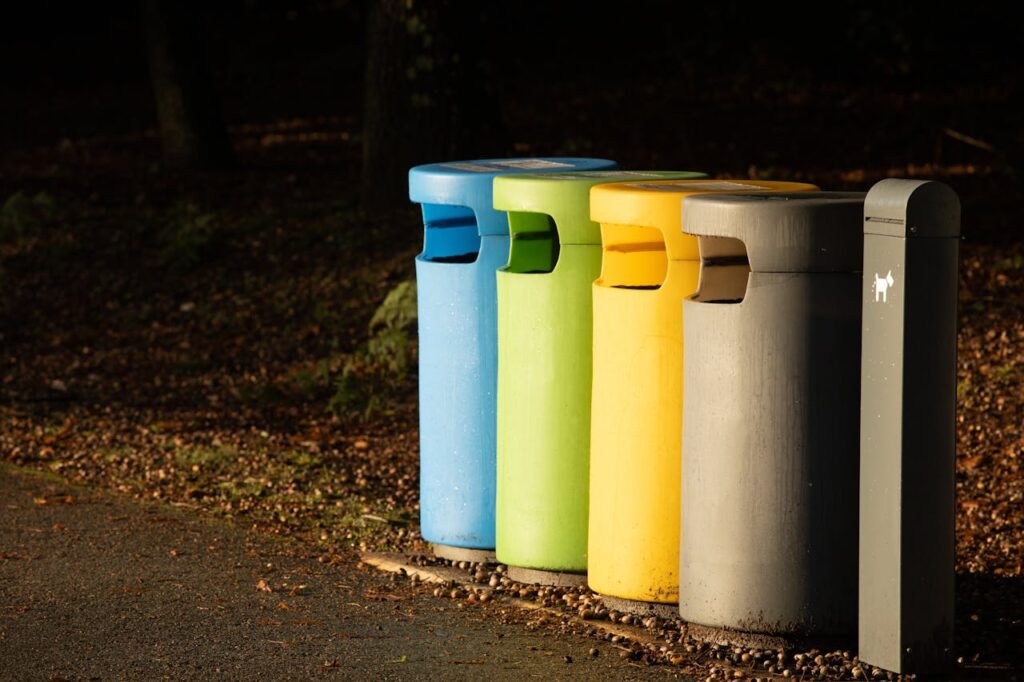
In many Western countries, there is a widespread belief among the public that they have largely solved the problem of plastic waste and that the issue lies within developing nations. This assumption stems from visible measures such as separate bins for plastic waste and household-level separation of recyclables, as well as less visible plastic pollution in public spaces and the environment.
However, this perception is misleading and overlooks the significant contributions of developed nations to global plastic pollution.
While developed nations may excel at separating plastic waste at the source and preventing it from leaking into the environment within their countries, the domestic recycling of plastics into new products is minimal. For example:
- Luxembourg: The country provides provisions for separating various types of plastic packaging, including lightweight food packaging, but lacks national capacity to upcycle or downcycle this waste effectively, thus exporting it to other EU countries for further processing.
- Germany: Over 90% of household plastic waste is collected and separated for recycling, but only a portion—estimated to be around 51%—is claimed to be exported for recycling or recycled into new products domestically.
- Switzerland: Despite provisions for PET plastic recycling, most other plastic packaging is mixed with household waste and incinerated for energy recovery. Only about 15% of Switzerland’s plastic waste is recycled.
- France: Only 26% of plastic waste is separated and collected. However, it is not clear how much of the collected plastic waste is actually recycled into new products inside France, and what percentage is exported, landfilled, or incinerated.
The United States: High Consumption, Low Recycling
In the U.S., plastic waste management faces significant challenges domestically, including with the separation of plastic waste from other recyclable waste, lack of incentives for recycling plastic waste domestically, and lack of effective policies. The U.S. has, for the most part, exported its plastic waste problem to developing nations until the Basel Convention Plastic Waste Amendment went into force in 2021. The United States is a signatory but not a party to the Basel Convention, as it has not ratified the treaty. Consequently, the U.S. is not bound by the convention’s regulations. However, the amendments have significant implications:
- Export restrictions: Parties to the Basel Convention are prohibited from trading covered plastic waste with non-parties like the U.S., unless a separate agreement exists that meets Basel criteria. U.S. Department of State
- Trade dynamics: Despite these restrictions, reports indicate that U.S. plastic waste exports have continued, sometimes increasing, with shipments rerouted to countries with less stringent import controls.
The U.S. does not have a federal ban or regulation specifically targeting single-use plastics, while developing nations such as Afghanistan do.
Hidden Contributions to Global Pollution
In summary, developed nations export the majority of their plastic waste problem and have not developed effective infrastructure to recycle it into new products within their territories. In fact, vast amounts of plastic waste were imported into developing nations from developed nations, creating severe environmental challenges in recipient countries. Since the Basel Convention’s Plastic Waste Amendments, these exports have been restricted, but domestic management challenges remain.
Furthermore, developed nations contribute significantly to plastic pollution globally in many other ways:
- Producers of single-use plastics and other plastic products: Major producers of plastics include developed countries such as the U.S., Germany, and Japan, even though developing countries such as China and India also produce large portions of plastic products.
- Higher per capita consumption of single-use plastics: Developed countries tend to have higher per capita usage of single-use plastics, driven by convenience-driven consumer lifestyles and well-developed packaging industries.
- Maritime activities: Cruise ships, primarily operated by companies in developed countries, are a major source of plastic pollution in oceans where they dump their waste into the water with little to no restrictions. The consequences are felt by small island nations like Seychelles and coastal areas in countries such as Ghana, where plastic debris is washed ashore.
Plastic Waste in Developing Countries
Developing countries have been tackling the plastic waste that is domestically produced while also dealing with enormous amounts of plastic waste imported into their territories for decades. Thus, some developing countries are advancing solutions to plastic waste through partial or total bans on single-use items and innovations in plastic waste recycling:
- Ban on single-use plastics: The latest report by UNEP demonstrates that tens of developing countries (at least 20 African nations) impose partial or total bans on plastic bags or other single-use plastic items.
- Advancement in plastic waste recycling: Developing countries such as Iran produce approximately 4 million tons of plastic waste annually but have developed initiatives to recycle a portion of it, including chemical recycling and plastic recycling machines. Another good example is India, whose informal recycling sector effectively processes large volumes of plastic waste, repurposing it into secondary products.
The Way Forward
The issue of plastic pollution is far from solved in the most developed nations. High consumption of single-use plastics and low recycling rates mean that the problem persists globally. Developed countries must go beyond separation and invest in:
- Improved recycling infrastructure: Enhance the actual recycling of plastics into new products domestically.
- Reduction of plastic consumption: Adopt stricter policies to reduce reliance on single-use plastics.
- Implementation of multilateral environmental agreements: Compliance by developed nations, strict enforcement of the Basel Convention Plastic Waste Amendments, and the upcoming plastic waste treaty will be crucial in meeting the goal of eliminating plastic pollution.
Plastic pollution is not just a problem of developing nations. Plastic waste is a global challenge that requires concerted efforts from all countries to address it effectively. The belief that the problem is solved in the West is a dangerous misconception that must be corrected for meaningful progress to be made. Next time you are in a supermarket, have a look around, and you will see the staggering amount of single-use plastic packaging that ends up in the landfill in the best-case scenario and in waterways and oceans in the most common scenario.